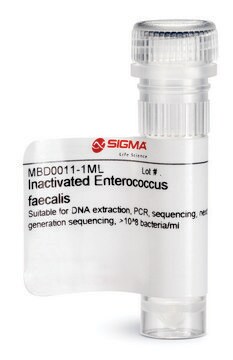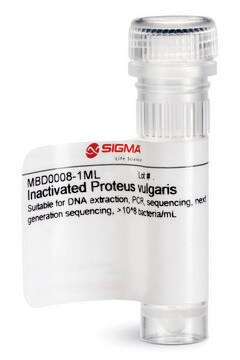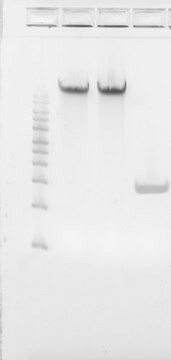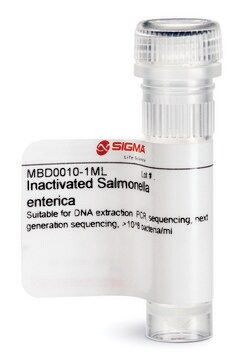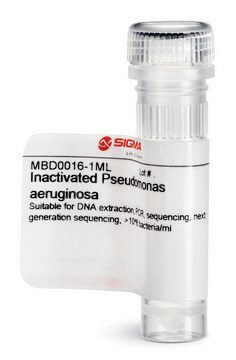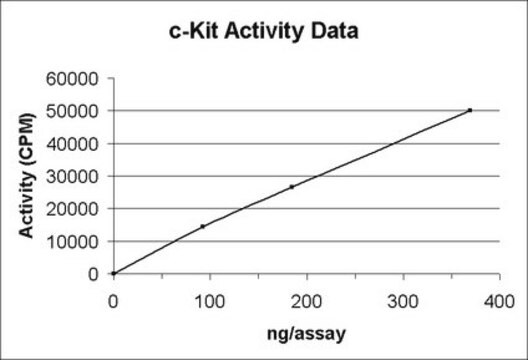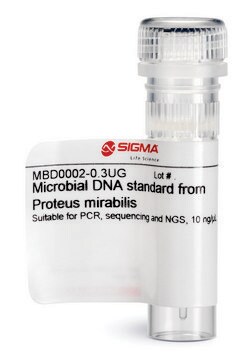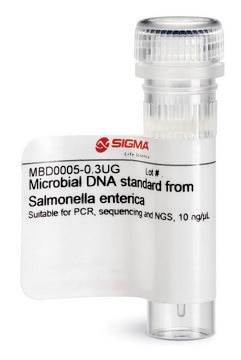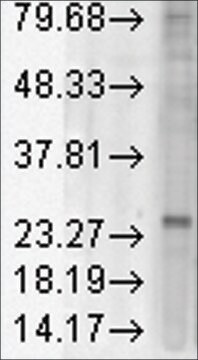추천 제품
Quality Level
양식
liquid
농도
>10^8 bacteria/ml
기술
DNA extraction: suitable
DNA sequencing: suitable
PCR: suitable
배송 상태
dry ice
저장 온도
−20°C
관련 카테고리
일반 설명
Standardization of sample analysis is currently neededin microbiome genomics research workflow. Lack of standardization can lead tobiases and errors in common processes during sample preparation and analysissuch as sample amplification, sequencing and bioinformatics analyses.1 Inactivated Proteus mirabilis can serve as standard for benchmarking theperformance along the workflow of microbiomics or meta-genomics analyses and asa tool to increase reproducibility and allow comparison of results obtained bydifferent labs.
Proteusmirabilis is a gram negative facultative anaerobicrod-shaped bacterium. Bacteria of the genus Proteus of the familyEnterobacteriaceae are opportunistic human pathogens responsible for wound andburn infections as well as skin, eye, ear, nose, throat, urinary tract, andgastrointestinal infections and bacteremias.2 The most common infection involving P. mirabilis occurs when the bacteria, which is a memberof the natural intestinal flora, moves to the urethra and urinary bladder causingurinary tract infection. The outer-membrane lipopolysaccharide (LPS) isconsidered an important virulence factor of Proteus.3 Arabski et al. suggest that theimmunological response against P. mirabilis LPS might play a role in rheumatoidarthritis.4 A possible correlation between the abundanceof P. mirabilis in the intestine and obesity was suggestedrecently.5
Read here how to use our standards to ensure data integrity for your microbiome research.
Proteusmirabilis is a gram negative facultative anaerobicrod-shaped bacterium. Bacteria of the genus Proteus of the familyEnterobacteriaceae are opportunistic human pathogens responsible for wound andburn infections as well as skin, eye, ear, nose, throat, urinary tract, andgastrointestinal infections and bacteremias.2 The most common infection involving P. mirabilis occurs when the bacteria, which is a memberof the natural intestinal flora, moves to the urethra and urinary bladder causingurinary tract infection. The outer-membrane lipopolysaccharide (LPS) isconsidered an important virulence factor of Proteus.3 Arabski et al. suggest that theimmunological response against P. mirabilis LPS might play a role in rheumatoidarthritis.4 A possible correlation between the abundanceof P. mirabilis in the intestine and obesity was suggestedrecently.5
Read here how to use our standards to ensure data integrity for your microbiome research.
애플리케이션
Inactivated bacteria are provided at >10^8 bacteria/ml concentration in TE buffer pH 8.0. It is recommended to avoid freeze thaw cycles of this product.
Suitable for Quantitative standard for PCR, Sequencing and NGS
Suitable for Quantitative standard for PCR, Sequencing and NGS
특징 및 장점
- Individual microbial standard for microbiomics and meta-genomics workflow
- Suitable standard for PCR, sequencing and NGS
- Improve Bioinformatics analyses
- Increases reproducibility
- Compare results lab to lab
물리적 형태
Liquid -The inactivated bacteria is provided at >10^8 bacteria/ml in TE buffer pH 8.0
Storage Class Code
10 - Combustible liquids
WGK
WGK 2
Flash Point (°F)
Not applicable
Flash Point (°C)
Not applicable
가장 최신 버전 중 하나를 선택하세요:
문서
Turn to our Next-Gen Sequencing Oligos (NGSO) as a potential solution if you are experiencing high levels of adapter dimer formation with custom adapters sourced from other vendors.
DNA standards enhance metagenomics research integrity, offering precise species study and mixed community standards.
자사의 과학자팀은 생명 과학, 재료 과학, 화학 합성, 크로마토그래피, 분석 및 기타 많은 영역을 포함한 모든 과학 분야에 경험이 있습니다..
고객지원팀으로 연락바랍니다.
